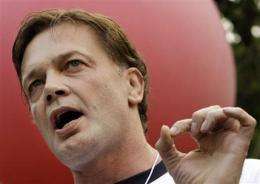Will autism fraud report be a vaccine booster?

(AP) -- This week more shame was heaped upon the discredited British researcher whose work gave rise to the childhood-vaccines-cause-autism movement, as a prominent medical journal published a report that the man had faked his data. But will it make a difference?
Some believe the latest news will finally destroy the reputation of researcher Andrew Wakefield and put an end to the claim of scientific underpinnings for the anti-vaccine movement. "We hope that declaring the paper a fraud will close that door for good," wrote the journal BMJ this week, in an editorial accompanying the report.
Yet at least some advocacy groups continue to take Wakefield's side. And though the latest report may ease the doubts of some parents, experts said they'd be surprised if the latest news changes views overall.
"This scared people and it's hard to unscare them," said Dr. Paul Offit, an infectious disease expert at the Children's Hospital of Philadelphia.
"Until medicine can step up and say, 'We understand the cause of autism,' they may never be assured," said Offit, who has written books criticizing the anti-vaccine movement.
Wakefield made international waves following the publication in 1998 in the Lancet, a prestigious medical journal, that he and his colleagues had linked measles-mumps-rubella vaccine with autism in most of a dozen children they had studied.
It was a small series of observations, wrapped in a hypothesis - not even a full medical study. But it exploded in the media, prompting a wave of parental concerns in England as well as the United States.
Immunization rates in Britain dropped from 92 percent to 73 percent, and were as low as 50 percent in some parts of London. The effect was not nearly as dramatic in the United States, but researchers have estimated that as many as 125,000 U.S. children born in the late 1990s did not get the MMR vaccine because of the Wakefield splash.
It's not clear how many U.S. parents knew details of the Wakefield paper, or how many even knew his name, vaccine experts say. But the research coincided with growing apprehension about autism in this country, and seemed to finally assign a likely reason for it. The idea that vaccines could cause autism took hold.
"Clearly, the results of this (Wakefield) study have had repercussions," said Dr. Michael Smith, a University of Louisville infectious diseases expert who has studied the autism controversy's effect on immunization rates.
Gradually, Wakefield's hypothesis was checked by other researchers who failed to confirm a link between vaccines and autism. It was dissected by experts, and 10 of the article's 13 authors renounced the work.
The first claims that Wakefield had doctored data came in a 2009 story in the Sunday Times of London by British journalist Brian Deer. That report said Wakefield made it seem some of the children did not experience symptoms until after they'd received their shots. Those findings were repeated in this week's report in BMJ.
Then, last year, the Lancet retracted the Wakefield paper - 12 years after it was published. Wakefield was also stripped of his right to practice medicine in Britain; he has no medical license in the U.S.
This week, Wakefield continued to defend himself, calling the journalist "a hit man" during an interview with CNN. And some parents of autistic children and other advocates argue that the criticisms of Wakefield are actually attempts to close off research into the safety of vaccines.
"A character assassination initiative against those who look for answers only serves to stunt medical progress for our children and perpetuate unnecessary public health risks," said Wendy Fournier, president of the National Autism Association, in a prepared statement.
But health officials counter that the science is settled and prolonging the debate is dangerous. Although U.S. vaccination rates have held steady through the last decade, health officials say vaccine fears led to outbreaks of measles and the virus Hib in 2008 in unvaccinated children in states like California and Minnesota. The Hib outbreak included at least one reported death.
In a country where the name Andrew Wakefield doesn't register with most people, it's not clear that this week's report will make much difference. But perhaps it might have impact if it sways celebrities who have lent their voice to the anti-vaccine movement, like Jenny McCarthy, who has voiced her views repeatedly on television shows like "Oprah."
"It will be interesting to see what Jenny McCarthy and others say" about the latest news, said Smith, the Louisville researcher.
A spokesman for McCarthy on Thursday said she was not available for comment.
©2010 The Associated Press. All rights reserved. This material may not be published, broadcast, rewritten or redistributed.
















